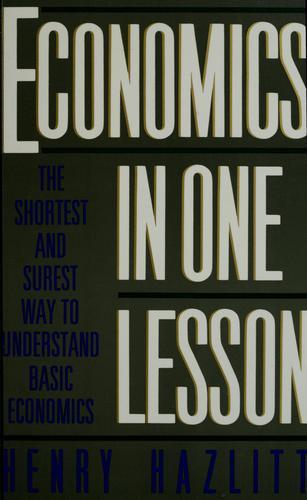Hardcover, 242 pages
English language
Published June 25, 1979 by Currency, Arlington House.

Hardcover, 242 pages
English language
Published June 25, 1979 by Currency, Arlington House.
Economics in One Lesson is an introduction to economics written by Henry Hazlitt and first published in 1946. It is based on Frédéric Bastiat's essay Ce qu'on voit et ce qu'on ne voit pas (English: "What is Seen and What is Not Seen").The "One Lesson" is stated in Part One of the book: "The art of economics consists in looking not merely at the immediate but at the longer effects of any act or policy; it consists in tracing the consequences of that policy not merely for one group but for all groups." Part Two consists of twenty-four chapters, each demonstrating the lesson by tracing the effects of one common economic belief, and exposing common economic belief as a series of fallacies.
Among its policy recommendations are the advocacy of free trade, an opposition to price controls, an opposition to monetary inflation, and an opposition to fiscal policy, such as …
Economics in One Lesson is an introduction to economics written by Henry Hazlitt and first published in 1946. It is based on Frédéric Bastiat's essay Ce qu'on voit et ce qu'on ne voit pas (English: "What is Seen and What is Not Seen").The "One Lesson" is stated in Part One of the book: "The art of economics consists in looking not merely at the immediate but at the longer effects of any act or policy; it consists in tracing the consequences of that policy not merely for one group but for all groups." Part Two consists of twenty-four chapters, each demonstrating the lesson by tracing the effects of one common economic belief, and exposing common economic belief as a series of fallacies.
Among its policy recommendations are the advocacy of free trade, an opposition to price controls, an opposition to monetary inflation, and an opposition to fiscal policy, such as stimulative governmental expenditures, arguing: There are men regarded today as brilliant economists, who deprecate saving and recommend squandering on a national scale as the way of economic salvation; and when anyone points to what the consequences of these policies will be in the long run, they reply flippantly, as might the prodigal son of a warning father: 'In the long run we are all dead.' And such shallow wisecracks pass as devastating epigrams and the ripest wisdom.